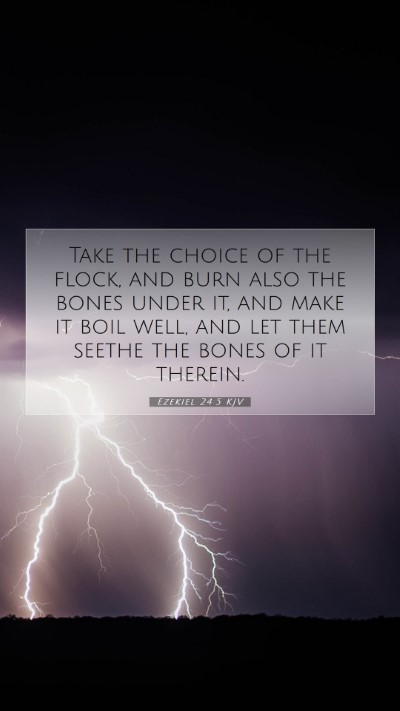Bible Verse Meaning of Ezekiel 24:5
Ezekiel 24:5 states, "Take the choice of the flock, and burn also the bones under it, and make it boil well, and let them seethe the bones of it." This verse symbolizes the impending judgment upon Jerusalem and its people. Below, we delve into a richer understanding of this passage, incorporating insights from various public domain commentaries.
Bible Verse Explanation
This verse is part of a prophetic message from Ezekiel, where God uses vivid imagery to convey the seriousness of His impending judgment. The choice of the flock represents the people of Jerusalem, signifying that they will be judged and left to face the consequences of their actions.
Understanding the Symbolism
- Choice of the Flock: This indicates that those being judged are not merely some; they are chosen ones who have misused their position.
- Burning Bones: The act of burning signifies total destruction, which underscores the severity of the punishment awaiting Jerusalem.
- Boiling Well: This can be seen as a metaphor for the refining process, suggesting that the people will undergo intense suffering as a means of punishment.
Bible Verse Interpretations
Various commentators provide insight into this verse:
Matthew Henry notes that this imagery illustrates God's judgment against the wicked, where not just the flesh but bones - the innermost part - indicate thoroughness of judgment against Israel's sin.
Albert Barnes emphasizes the importance of such representations, stating that God often used symbolic visions to communicate profound truths about His nature and intentions. Here, it serves to highlight God’s holiness and justice.
Adam Clarke draws a parallel with sacrificial rites in the ancient Israelite culture, reinforcing the idea that sacrifices carry significant weight and symbolism, particularly regarding atonement and judgment.
Significance of Ezekiel 24:5 in the Context of Scripture
This verse is significant for it serves as a prophetic reflection on the consequences of Israel's unfaithfulness. It speaks to the broader narrative of divine justice throughout the Scriptures.
Cross References
- Ezekiel 22:31: "Therefore have I poured out mine indignation upon them; I have consumed them with the fire of my wrath." - This emphasizes God's judgment.
- Jeremiah 7:20: "Therefore thus saith the Lord God; Behold, mine anger and my fury shall be poured out upon this place, upon man, and upon beast, and upon the trees of the field, and upon the fruit of the ground." - Another prophetic message of impending judgment.
- Zephaniah 1:18: "Neither their silver nor their gold shall be able to deliver them in the day of the Lord's wrath; but the whole land shall be devoured by the fire of his jealousy." - A direct reference to the necessary judgment of God due to sin.
Bible Study Insights
In studying Ezekiel 24:5, we can derive several key insights into the nature of God, judgment, and the importance of remaining faithful to His commands:
- God's Justice: This verse portrays God's commitment to justice and His expectation of holiness from His people.
- The Role of Prophecy: It underscores the role of prophets as God's mouthpiece, relaying messages meant to warn and instruct His people.
- Application in Daily Life: Understanding this verse prompts reflection on personal faithfulness and accountability to divine standards.
Engaging with Scripture
For those participating in Bible study groups or engaging in online Bible study, exploring texts like Ezekiel is vital. Consider using various Bible study tools such as commentaries, historical contexts, and linguistic studies. Here are a few methods for deeper understanding:
- In-depth Analysis: Dive into the historical context of the time period for greater insight into the prophet's messages.
- Group Discussions: Engage in discussions with peers to share interpretations and applications of the scripture.
- Supplementary Materials: Utilize Bible study resources and guides that offer further background on prophecy in the Old Testament.
Conclusion
Ezekiel 24:5 serves not just as a frightening warning, but as an encouragement to live righteously. Its powerful imagery remains relevant, calling believers to reflect on their standing before God and the collective condition of society as it pertains to faithfulness. As you seek to deepen your understanding of Scripture and interpret difficult passages, consider the profound meanings behind prophetic texts like this one.


